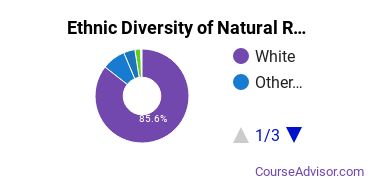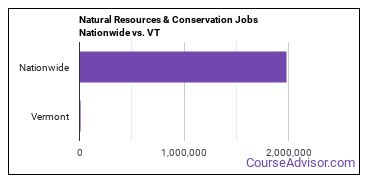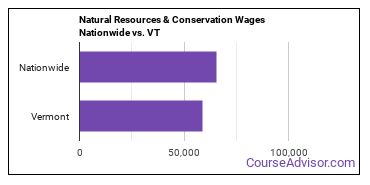Natural Resources & Conservation Schools in Vermont
395 Natural Resources & Conservation students earned their degrees in the state in 2022-2023.
As a degree choice, Natural Resources & Conservation is the 9th most popular major in the state.
Education Levels of Natural Resources & Conservation Majors in Vermont
Natural Resources & Conservation majors in the state tend to have the following degree levels:
| Education Level | Number of Grads |
|---|---|
| Bachelor’s Degree | 364 |
| Associate Degree | 15 |
| Master’s Degree | 14 |
| Doctor’s Degree (Research / Scholarship) | 2 |
| Doctor’s Degree (Professional Practice) | 2 |
| Doctor’s Degree (Other) | 2 |
Gender Distribution
In Vermont, a natural resources & conservation major is more popular with women than with men.

Racial Distribution
The racial distribution of natural resources & conservation majors in Vermont is as follows:
- Asian: 1.8%
- Black or African American: 0.0%
- Hispanic or Latino: 4.1%
- White: 83.3%
- Non-Resident Alien: 2.5%
- Other Races: 8.4%

Jobs for Natural Resources & Conservation Grads in Vermont
There are 3,320 people in the state and 1,982,470 people in the nation working in natural resources & conservation jobs.

Wages for Natural Resources & Conservation Jobs in Vermont
A typical salary for a natural resources & conservation grad in the state is $58,790, compared to a typical salary of $65,320 nationwide.

Most Popular Natural Resources & Conservation Programs in VT
There are 11 colleges in Vermont that offer natural resources & conservation degrees. Learn about the most popular 11 below:
This public school has an average net price of $20,795. Seeking financial aid? At this school, 98% of students receive it. The student to faculty ratio is 17 to 1.
Request Information91% of the teachers are full time. Students who attend this private institution pay an average net price of $25,185. 9 to 1 is the student to faculty ratio.
Request InformationOf all the students who attend this school, 100% get financial aid. It takes the average student 4.09 years to graduate. This private institution charges an average net price of $25,392.
Request InformationOf all the teachers who work at the school, 43% are considered full time. This private school has an average net price of $23,087. It takes the average student 4.19 years to graduate.
Request InformationSeeking financial aid? At this school, 98% of students receive it. 45% of the teachers are full time. This private institution charges an average net price of $29,787.
Request InformationOf all the students who attend this school, 97% get financial aid. 21 to 1 is the student to faculty ratio. Students who attend this public school pay an average net price of $9,734.
Request InformationOf all the students who attend this school, 100% get financial aid. The full-time teacher rate is 100%. Students who attend this private institution pay an average net price of $32,455.
Request InformationThe full-time teacher rate is 19%. Students enjoy a student to faculty ratio of 12 to 1.
Request InformationA typical student attending Vermont Tech will pay a net price of $18,297. Of all the students who attend this school, 100% get financial aid. Most students complete their degree in 4.55 years.
Request InformationNatural Resources & Conservation Careers in VT
Some of the careers natural resources & conservation majors go into include:
| Job Title | VT Job Growth | VT Median Salary |
|---|---|---|
| Fire Inspectors | 33% | $56,680 |
| Firefighters | 4% | $34,730 |
Related Majors in Vermont
Below are some popular majors in the state that are similar to natural resources & conservation.
| Major | Annual Graduates in VT |
|---|---|
| Biological & Biomedical Sciences | 574 |
| Engineering | 346 |
| Military Technologies & Sciences | 160 |
| Agriculture | 153 |
| Mathematics & Statistics | 139 |
| Physical Sciences | 111 |
| Engineering Technologies | 80 |
| Architecture/Urban Planning | 41 |
View all majors related to Natural Resources & Conservation
Explore Major by State
Alabama
Arkansas
Connecticut
Florida
Idaho
Iowa
Louisiana
Massachusetts
Mississippi
Nebraska
New Jersey
North Carolina
Oklahoma
Rhode Island
Tennessee
Vermont
West Virginia
View Nationwide Natural Resources & Conservation Report
References
- College Factual
- National Center for Education Statistics
- O*NET Online
- Image Credit: By Lynn Betts under License
More about our data sources and methodologies.






